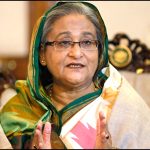The Bangladesh government imposed a nationwide ban on several major social media apps and communication platforms, according to multiple media reports.
Bangladesh has banned a number of well-known social media sites including YouTube, WhatsApp, Instagram, and TikTok, according to several media reports.
Since its announcement on August 2, this action has essentially limited access to these popular social networks across the country.
The restriction was put into place on August 2 and prevented users in Bangladesh from accessing any of the social networking sites named above. It’s interesting to note that the decision was made soon after Turkey declared it would prohibit Instagram, in response to criticism from a lawmaker over the content being shared on the platform on the death of Ismail Haniyeh, the leader of Hamas.

People will not be able to use popular social media apps like Facebook, TikTok, WhatsApp and YouTube for now due to the enforcement of strict blocking mechanisms, although mobile internet services restored in Bangladesh after a break of over 10 days.
The decision by the Bangladeshi government came following a similar action by Turkey, which also announced a ban on Instagram earlier the same day.
This is not the first time that Bangladesh has imposed a ban on meta platforms. This latest ban follows a suspension of Meta’s platforms — Instagram and Facebook — in July. The earlier shutdown was in response to widespread unrest witnessed in the country over quota reforms.
In a meeting at the Bangladesh Telecommunication Regulatory Commission (BTRC) today, mobile operators were instructed to block these apps.

State Minister for Post, Telecom and ICT Zunaid Ahmed Palak was present in the meeting, where officials of the telecom operators and different government agencies took part.
As people mainly use social media platforms for communication and entertainment, blocking popular messaging, calling, and video streaming apps would lead to very limited data usage.
People will not use their data because of this limited access to social media platforms, said an official of a mobile operator.
The government has taken a tough stance against social media giants in light of the recent violence around the quota reform movement and accused these platforms of spreading rumours and fake news.
Earlier on July 24, Palak said social media platforms, especially Facebook and YouTube, have not been complying with Bangladesh’s laws.
“They are also not taking into account the situation on the ground, violating their policy guidelines … Amid this, who will take the risk [of opening the social media platforms]?” he said.
In today’s media briefing, Palak said letters have been sent to social media companies, including Facebook and TikTok, and they have been asked to provide a response in person by July 31.
Mobile internet restored across the country at around 3pm today.

Early on July 17, the government shutdown mobile internet amid countrywide violence centring the quota reform movement.
At that time, Palak said the decision was made “in light of the current crisis in the country and to stop the spread of fake news on social media”.
Turkey on Friday blocked access to the Instagram social media network, the national communications authority said without explanation, following censorship accusations against the US company by a high-ranking Turkish official.
The BTK communications authority said in a post on its website that “instagram.com has been blocked by a decision on the date of 02/08/2024”, without adding further details. Many users living in Turkey complained on the X platform that they could not refresh their Instagram feed.
The latest prohibition follows a suspension of Meta’s platforms, including Instagram and Facebook, in July. Meanwhile, the broadband services were partially restored on July 23, mobile networks remained offline until July 28. The earlier shutdown was in response to widespread unrest witnessed in the country over quota reforms.
With over 1 billion active monthly users, TikTok remains one of the most popular social media platforms to date. The hype around it shows no signs of slowing down – as well as its controversy. The latter caused numerous TikTok bans around the world.








